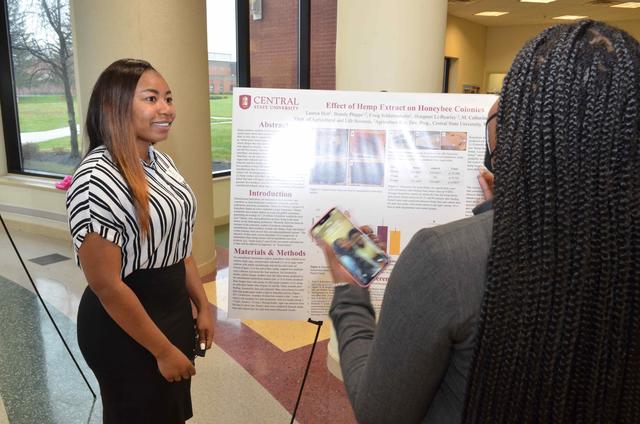
STEM Success Center
STEM Success Center

Central State University, Ohio's only public Historically Black University and 1890 Land-Grant Institution, intends to improve the quality of preparation of underrepresented students, particularly women, for careers in science, technology, engineering, and mathematics (STEM) and graduate work by providing a comprehensive suite of services through this institutional grants proposal.
The STEM Success Center (SSC) is based on the premise that if academically underprepared students receive early additional academic assistance through professional and peer mentoring and are supported by a network that removes nonacademic barriers, they will perform better and are more likely to graduate and join the STEM workforce.
-
SCC goals
- Establishing a comprehensive learning system that addresses the deficiencies of STEM majors.
- Establishing a STEM Success Center.
- Enhancing students’ experiential learning opportunities and professional development.
All three goals address the competitive priority as they are based on the identification of the needs of students and seek to implement instructional strategies, systems, and structures that improve postsecondary learning and retention, resulting in the completion of a degree in a STEM field. Central State will implement a tutoring and supplemental instruction system for 10 critical courses that STEM students must pass in their first two years. Faculty members will increase instruction time outside the classroom to provide students with additional learning time. We will also ensure synergy with tutoring and supplemental instruction by infusing professional and student tutors into these specific courses.
SCC objectives
- Increase the passing rate of freshman students in the five first-semester STEM classes from 58% to 83% by the end of the project period.
- Increase the passing rate of freshman students in the three second-semester STEM classes from 59% to 83% by the end of the project period.
- Increase the passing rate of students in the three mathematics classes from 49% to 72%.
- Increase the number of students retained from 122 to 168; and increase the number of persisting from 68 to 82.
- Ensure all CSU STEM majors receive academic advising from STEM faculty on a timely basis.
- Provide nonacademic counseling including mentoring to STEM majors.
- Pair female STEM students with female STEM faculty and professionals.
- Ensure 24 STEM students engage in experiential learning opportunities.
- Ensure 30 students attend and participate in academic-related conferences and workshops.
- Reach a 75% rate of CSU STEM students who attend development workshops.
-
As a demonstration of Central State's commitment to the SSC, faculty will provide tutoring for STEM students in the center at no charge to the project, and one of the co-project directors will provide services in kind. To ensure the successful implementation of the SSC, the center will have two co-project directors. Dr. Ibrahim Katampe, chair, Department of Agricultural and Life Sciences, will serve as the academic project director. Dr. Morakinyo Kuti, director, Office of Sponsored Programs and Research, will serve as the nonacademic project director.
Dr. Katampe is an active researcher who supervises undergraduate student research. Dr. Kuti is a certified research administrator and is the project director for the largest STEM scholarship program at Central State.
Successful implementation of this project will have national implications. A majority of underrepresented minorities are not college-ready when they start college; therefore, they drop out at a higher rate than the majority population after the first year. The lack of preparation is also manifested in upper-level classes because underrepresented minorities do not have the foundational knowledge necessary to succeed as STEM majors. A significant increase in the graduation of underprepared students, particularly women, will enhance the nation’s competitiveness in the global marketplace.